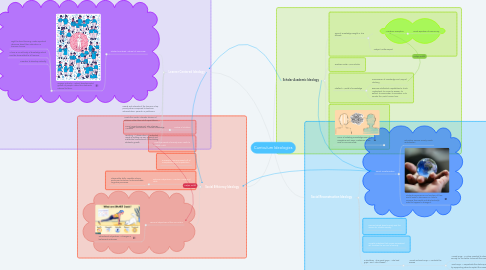
1. Social Efficiency Ideology
1.1. Nature of Children
1.1.1. Human interactions = shared knowledge
1.2. Meet the Needs of Society From Youth to Mature Adult
1.3. Successful Learners Based Off of Competencies and Capabilities
1.4. Behavior Objectives = Maintain Mastery of Skills
1.4.1. Observable Skills, capable actions, performed activities, & demonstrable cognitive processes.
1.5. Terminal Objectives of the Curriculum
1.5.1. Educational Objectives = Changes in behavioral outcomes
2. Learner Centered Ideology
2.1. Student Centered "School of Tomorrow"
2.1.1. Organic Schools = natural developmental growth of people, rather than demands external to them.
2.1.1.1. Right to direct learning, make important decisions about their education, & learners choices.
2.1.1.2. "There is no set body of knowledge which must be transmitted to all learners.
2.1.1.3. Freedom to develop naturally
2.2. Needs and interests of the learners is top priority when compared to teachers, administration, parents, or politicians.
2.3. Meets the needs, interests, desires of children rather than adult expectations.
2.4. Social Aspect Does Not Take Place By Accident
2.5. Teaching: 1) Observation of individual needs 2) Setting up SEL, physical and intellectual environment 3) Facilitating students' growth
3. Scholar Academic Ideology
3.1. Type of Knowledge Taught In The Schools
3.1.1. Academic Discipline
3.1.1.1. Great Equalizer of Democracy
3.1.2. Subject Matter Expert
3.2. Teachers' Role= Mini-Scholar
3.3. Intellect = World of Knowledge
3.3.1. Transmission of Knowledge and Ways of Thinking
3.3.2. Exercise Intellectual Capabilities to Think, Understand, to Know, to Reason, to Reflect, to Remember, to Question, & to Ponder the World Around You.
3.4. Form of Initiating Knowledge Base of a Discipline and Ways Academics Think, Feel, & Communicate
3.4.1. "the basic information needed to thrive in the modern world"
3.4.2. Hierarchical Community
3.4.2.1. New Knowledge, Teachers of Knowledge, & Learners of Knowledge
4. Social Reconstruction Ideology
4.1. Social Transformation
4.1.1. Educators assume society needs revitalization
4.1.2. Students experiences and analysis of their world leads to discussion on how to improve their world and what action(s) need to happen to change it.
4.2. Diverse beliefs about society and the visions for a better society.
4.3. Societal problems that remain unresolved will threaten the survival of society.
4.4. 3 Identities: "The good guys", "The bad guys", and "The masses".
4.4.1. "Good and Bad Guys" = controls the masses
4.4.1.1. "Good Guys" = Future oriented to change society for the better to benefit the masses
4.4.1.2. "Bad Guys" = Perpetuate the status quo by supporting ideas to exploit the masses
